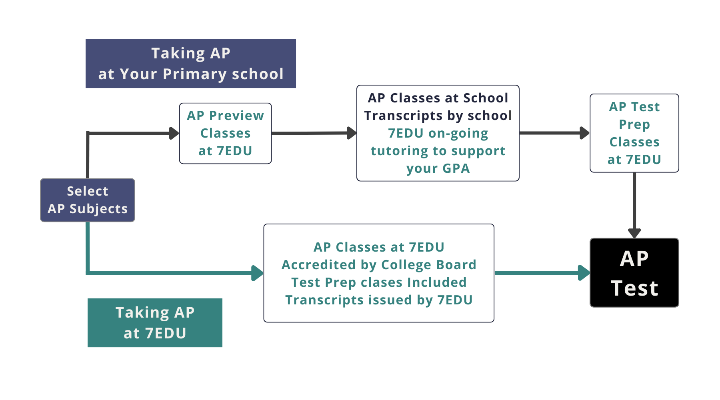If you are currently a student in high school, you might be wondering about what AP classes you should be taking or the advantages of whether you should even sign up for one. You probably know that these courses are intended to be advanced and an introduction to college-level material. But why should you consider enrolling?
In today's blog, you will learn the four benefits of signing up for AP classes while you are in high school.
Understanding AP Classes and College Credit Opportunities
For starters, if you are unfamiliar with what AP classes are, they stand for Advanced Placement. Advanced Placement is a CollegeBoard program that will enable students to take classes during high school and receive college credit and/or make you eligible for other advanced courses when you start at a college.
These courses are structured to introduce you to the learning experience of a preparatory-degree class during high school. If you are able to pass the AP exam for the course, you will receive college credit. These tests are held at the end of the academic year in May (they are scored between 1 and 5, with any mark above a 3 considered as passing).
The Four Benefits Of Taking AP Classes

AP classes will boost your GPA
Advanced Placement classes during your high school years are a great way to challenge yourself academically due to the higher time commitment required and longer hours to perform well. As a result, AP classes are graded on a weighted scale system to properly reward students performing well and avoid penalizing learners who are struggling in these tougher courses.
The AP GPA scale does not function on the standard 4.0 scale. Instead, AP classes are graded on a weighted scale that goes up to 5.0. The traditional scale has a 4.0 as an A, 3.0 as a B and so on. The AP GPA scale has a 5.0 as an A, 4.0 as a B, and so on.
Due to the difference in the grading scale, dedicated students can achieve a GPA higher than a 4.0 and avoids penalizing those that want to challenge themselves with more difficult classes. You can receive a B in an AP course while still preserving a 4.0 GPA.
The unweighted GPA will be one standard measure of your academic achievements, but the weighted AP GPA will also be assessed as evidence of how rigorous your high school course load was.
AP classes can earn you college credit
One of the biggest perks of taking an Advanced Placement class is that you can receive college credit if you score well enough on the AP Exam at the end of the year in May. These tests are scored on a scale of 1 to 5, with 5 being the highest that you can achieve.
Depending on the university that you are applying at, they will accept a 4 or 5 on an AP test as college credit in that particular subject area. For some, a 3 may be accepted as well.
If you are awarded college credit for your AP classes, you may also be able to skip out on some college introductory classes when you start as a freshman. This will enable you to move directly to upper-level courses that are more tailored to your major.
With 39 AP courses, you can talk to your counselor about what AP classes that you should take based on your personal strength and interests. Regardless of where you plan to take AP courses, at school or at 7EDU, we can support your learning journey.

AP classes can help you receive distinguishing merit
Through taking AP courses, you can illustrate your scholastic capabilities and obtain a grant.
The CollegeBoard itself awards students through their AP Scholar Awards where high school students are acknowledged for their praiseworthy performance on their AP exams. This grant is non-monetary and is an academic distinction intended for use on students' credentials on their applications and resumes.
Students who are recognized for their commendable achievements on their AP tests will be notified in mid-July via email (appearing in their online score report).
Some of the College Board's AP Scholar Awards:
AP Scholar: Granted to students who receive scores of 3 or higher on three or more AP Exams
AP Scholar with Honor: Granted to students who receive an average score of at least 3.25 on all AP Exams taken, and scores of 3 or higher on four or more of these exams
AP Scholar with Distinction: Granted to students who receive an average score of at least 3.5 on all AP Exams taken, and scores of 3 or higher on five or more of these exams
AP International Diploma: Awarded to students who display exceptional achievement across a variety of disciplines
AP classes will improve your college admission chances
Taking an AP course and passing its exam demonstrate a student’s capability of handling corresponding college-level work, which will strengthen college applications immensely.
By signing up for an Advanced Placement course during high school, you are signaling to the admission counselors that you are prepared for the pressure of learning in a college-level environment.
AP classes are designed to help enhance your academic skills, think critically, and overall strengthen your problem-solving talents. This early exposure will be beneficial as a college freshman and help you navigate the academic rigor and expectations that you will face within incoming college courses.
If you are able to perform well in an AP course, the admission office will be better able to assess your competency to succeed at their college campus.
